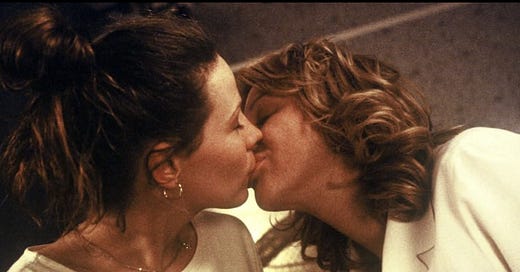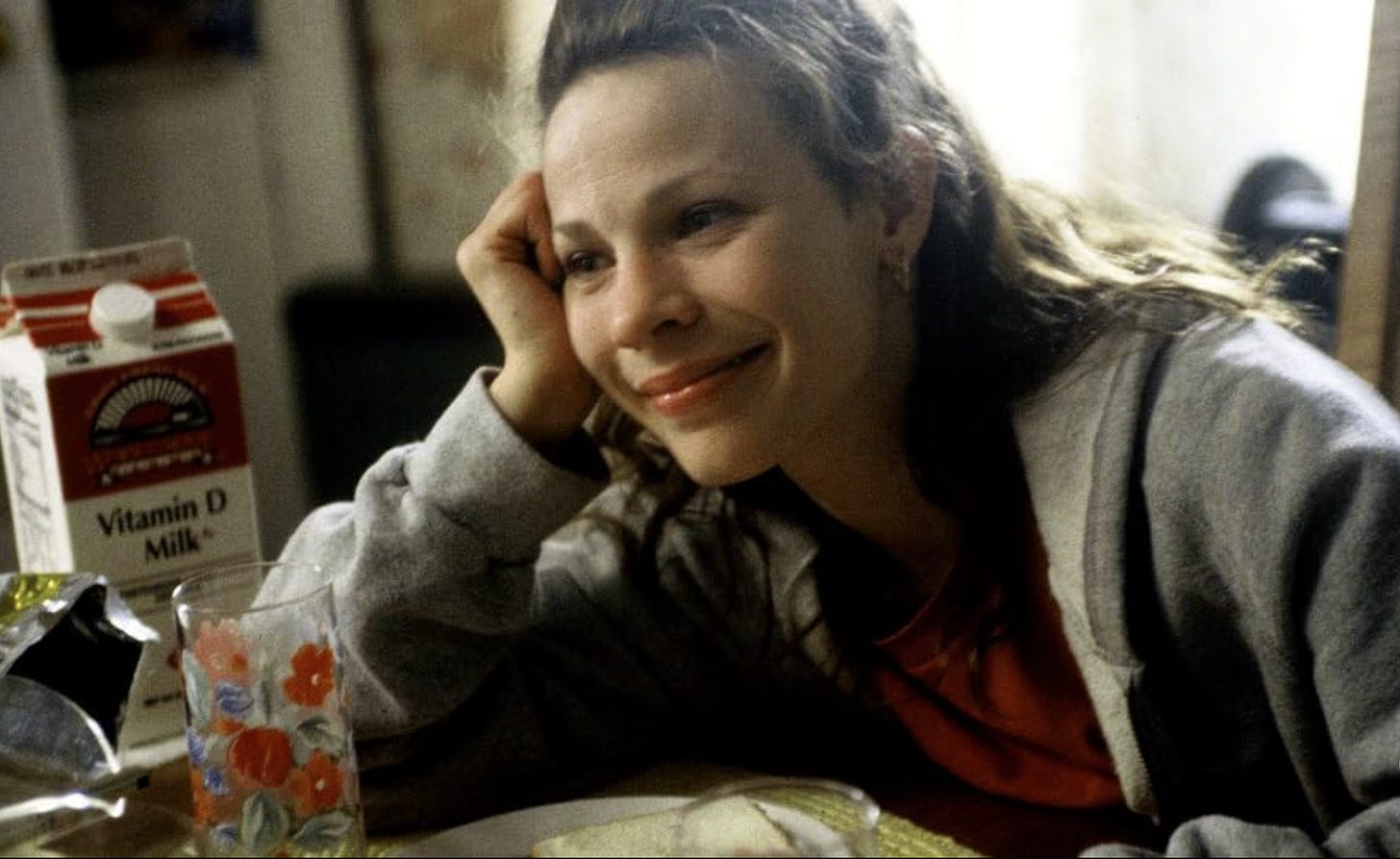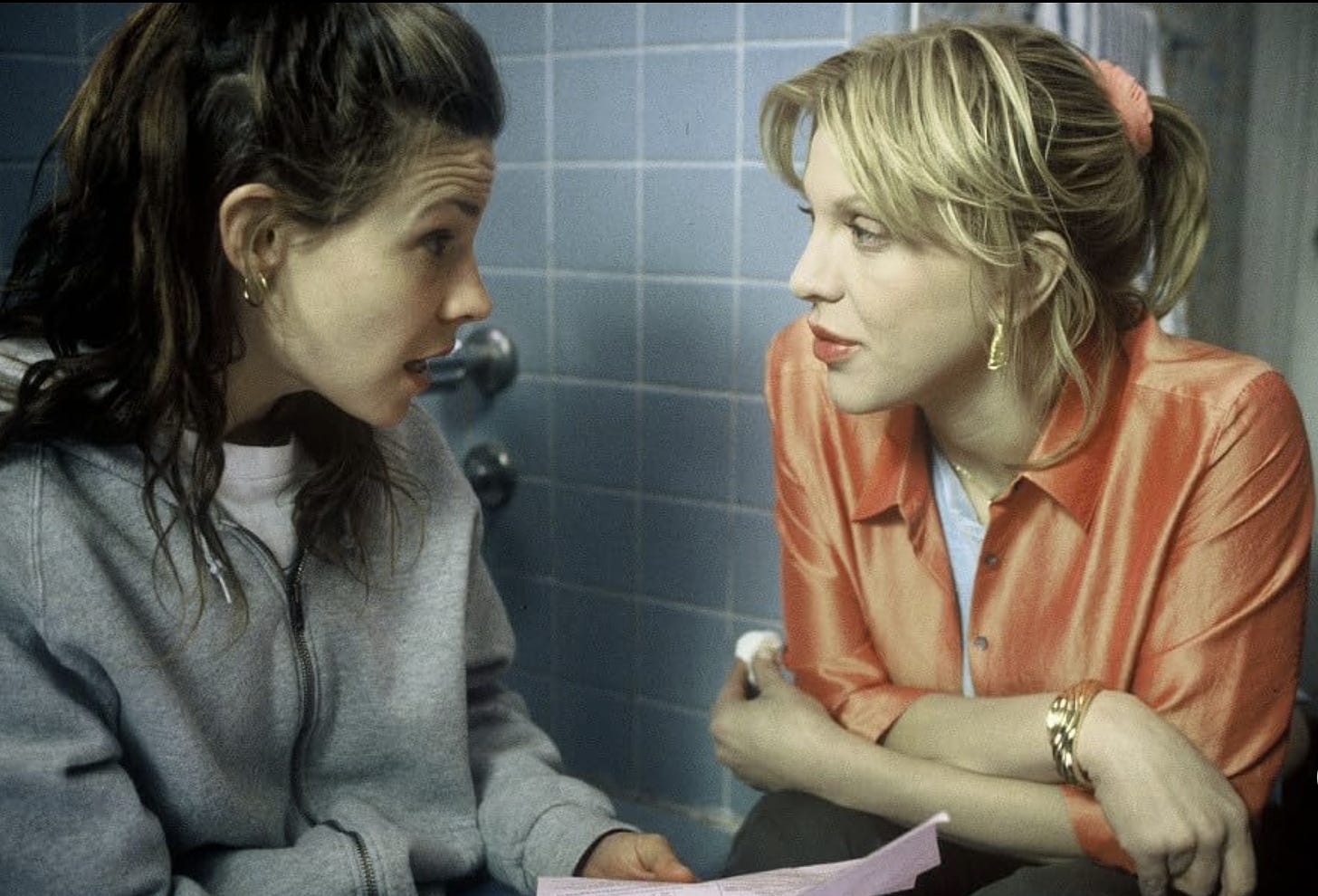Directed: Bob Gosse
Written: Bob Gosse and Wendy Hammond
After a long hibernation, this Lili Taylor/Courtney Love finally saw the light of day, and not before time. After a brief festival run in 2002, for some reason this thought-provoking tale was buried for a long time in the rubble that is Courtney Love's career.
Some viewers might be weirded out by how young The O.C star Mischa Barton looks. It's not a trick of the light, this movie was made years ago when Barton actually was young enough to be wearing a school uniform for real. Finally the film is got a run in 2005 on Here!, the American gay TV channel, and a larger audience got to judge for themselves the complicated issues that are dug up by Julie Johnson's complex journey of self-discovery.
Julie Johnson (Lili Taylor) is a New Jersey housewife who is smarter than even she thinks she is. She's the classic example of potential without opportunity. She married young because that's what she was expected to do. She had kids, kept house for her policeman husband and never considered that there might be more to life. She buys a copy of American Scientist each week with her groceries and knows her overbearing, unsympathetic husband well enough to hide the magazines from him. But every day she expands her knowledge and wonders what it would be like to know more.
Finally, against her husband's wishes, she persuades her best friend Claire (Courtney Love) to come to a computer class with her as a stepping stone to maybe getting their GEDs (high school equivalency). There she meets an inspirational teacher who helps her begin to unlock an unlikely genius for theoretical physics.
As Julie's eyes are opened, things begin to go badly on the home front. Her husband orders her to stop going to class. Unable to stop learning now that she has begun, Julie leaves her husband. She and Claire move in together with Julie's two children. Finally, gradually, Julie admits to Claire that she's in love with her. After initial resistance, Claire admits the feeling is mutual. Their affair is sweetly passionate, almost like two teenage girls finding love for the first time.
In fact, just about everything Julie does feels like she's doing it for the first time. Much praise must go to Lili Taylor for successfully bringing out both the girlish and womanly aspects of the character. There's a strange naiveté to her actions that is thoroughly disarming, especially when she is thrown emotionally up against inevitable realities. The dissolution of her marriage is real. Her alienation from her family and friends is real. Claire's doubts about their relationship are real. The responsibilities she has towards her children are real. However, Julie remains single minded in her determination to learn, and from the beginning it is obvious that it will cost her everything.
Julie's life revelations don't sit well with her eldest daughter Lisa (Mischa Barton). After all, isn't the mother supposed to the be the grown up and together one? After the thrill of first love is gone, even Claire starts to feel the pinch. Announcing you are a lesbian and moving in with your female lover is not an easy way to live, not in New Jersey. Love and passion are all well and good, but what about having a life? Friends? A future?
While Julie remains stuck in the clouds of her sexual awakening and her ambitions, she doesn't really even notice that Claire is slipping away. When faced with Claire's choice she sees her lover's actions as a defection. However, as painful as losing Claire is, Julie's sexual revolution is ultimately not as important to her as her intellectual one.
For Julie, education and her old life are incompatible. It's a difficult assumption to swallow, particularly for those of us who never had to make that choice. It seems odd to me in this day and age that a husband would forbid his wife from being educated. Even Claire, who initially understands Julie's quest for freedom, comes to fear Julie's burgeoning intellectualism. She feels that Julie looks down on her for not having the same thirst and capacity for knowledge.
While Julie denies it, perhaps she does feel superior. This is a film that deals in absolutes. Julie will let nothing stand in her way once she has found her calling. Claire needs to be totally supportive of Julie, or else she's siding with the enemy. Julie's husband feels that all of his needs must be met before hers, simply because he is the man. Julie's children don't understand why anything needs to change at all, and they rebel as one would expect.
Julie's resolve remains remarkably unshaken and her journey is monumental, but it also feels a bit cold and empty. It's difficult to fault her for wanting it all, but she certainly does not emerge with everything she wants. In fact, she has willingly sacrificed almost every relationship she holds dear in her lust for knowledge. Certainly she will continue on and have a more productive life than before, but it is hard to put a value judgement on it and say she'll be better for it.






